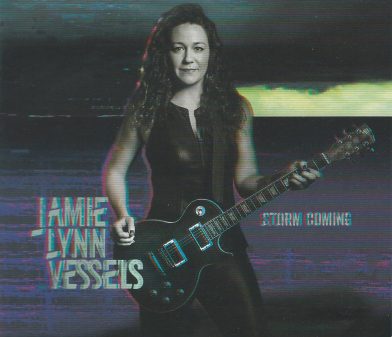Among his other talents, Paul Sanchez is quite a talent scout, and when he told me to check out Jamie Lynn Vessels I stuck that info into my “in” file. Not long after I was walking up Esplanade from the river and a block away from Checkpoint Charlie I could hear some hellfire rock bursting out into the night. I poked my head in and there stood Vessels, a statuesque 72 inches tall clad in black leather, belting out the blues in front of a small band and accompanying herself on a crunching Les Paul. I had to sit down and check this out and there was no question she was the real thing and then some.
 It’s one thing to sound that good live and quite another to get it all down in the studio. I am happy to report that Vessel’s second album, Storm Coming, is every bit as compelling as she is live. Reviewers are quick to make comparisons and some of those are not very useful but the oft-mentioned resemblance between Vessels and Bonnie Raitt makes sense, at least vocally. Raitt is the more skillful stringbender but Vessels writes big, open chord anthems that match her outstanding voice. Her songwriting is deceptively good—she begins with the massive title track, stacks up a series of really sharp relationship songs, then twists the drama deeper and deeper as the album progresses. Beginning with “The Devil In Your Eyes” and proceeding through the terrific “Witness,” Vessels rewrites some deep blues mythology: “Came to the crossroads/ Said my goodbyes/ I wrote you a letter/ And then I burned it sky high/ Let me be your witness to this story/ Take your money to your grave, I’ll keep my life.” But finishing the narrative isn’t easy, as “Done Me Wrong” and “Fool Me Twice” confirm before Vessels blasts one over the fence again with “Whiskey Blues,” a dramatic account of a 30-day bender that scans like The Lost Weekend: “Thirty days in the wind/ Someone told me, start again/ Whiskey filling up my glass/ Whiskey had me repeating the past.” “I got trouble,” Vessels confesses, but not as much as the subject of the album’s most beautiful and disturbing song, “Burn,” which could be a suicide or murder ballad with a dramatic string arrangement, but always seems like something a little bit more: “It might take me time/ Till I can draw the line/ Between sorrow and life/ Till I can be fine… but I’ll never be fine.”
It’s one thing to sound that good live and quite another to get it all down in the studio. I am happy to report that Vessel’s second album, Storm Coming, is every bit as compelling as she is live. Reviewers are quick to make comparisons and some of those are not very useful but the oft-mentioned resemblance between Vessels and Bonnie Raitt makes sense, at least vocally. Raitt is the more skillful stringbender but Vessels writes big, open chord anthems that match her outstanding voice. Her songwriting is deceptively good—she begins with the massive title track, stacks up a series of really sharp relationship songs, then twists the drama deeper and deeper as the album progresses. Beginning with “The Devil In Your Eyes” and proceeding through the terrific “Witness,” Vessels rewrites some deep blues mythology: “Came to the crossroads/ Said my goodbyes/ I wrote you a letter/ And then I burned it sky high/ Let me be your witness to this story/ Take your money to your grave, I’ll keep my life.” But finishing the narrative isn’t easy, as “Done Me Wrong” and “Fool Me Twice” confirm before Vessels blasts one over the fence again with “Whiskey Blues,” a dramatic account of a 30-day bender that scans like The Lost Weekend: “Thirty days in the wind/ Someone told me, start again/ Whiskey filling up my glass/ Whiskey had me repeating the past.” “I got trouble,” Vessels confesses, but not as much as the subject of the album’s most beautiful and disturbing song, “Burn,” which could be a suicide or murder ballad with a dramatic string arrangement, but always seems like something a little bit more: “It might take me time/ Till I can draw the line/ Between sorrow and life/ Till I can be fine… but I’ll never be fine.”
At this point it’s clear that Vessels is far more than just another blues rocker. She closes the album with a heartbreaking tribute to a beleaguered friend, “For Kim,” and I’m guessing I know who she’s referring to but I’m not going to say it here. Why?
“Because no one knows, no one could know /The pain and the fear and the loss” But I’m heartened, as much as I’m sure Kim is, by the last line of the song, and the album: “Baby, this too, shall pass/ And all is not lost.”



